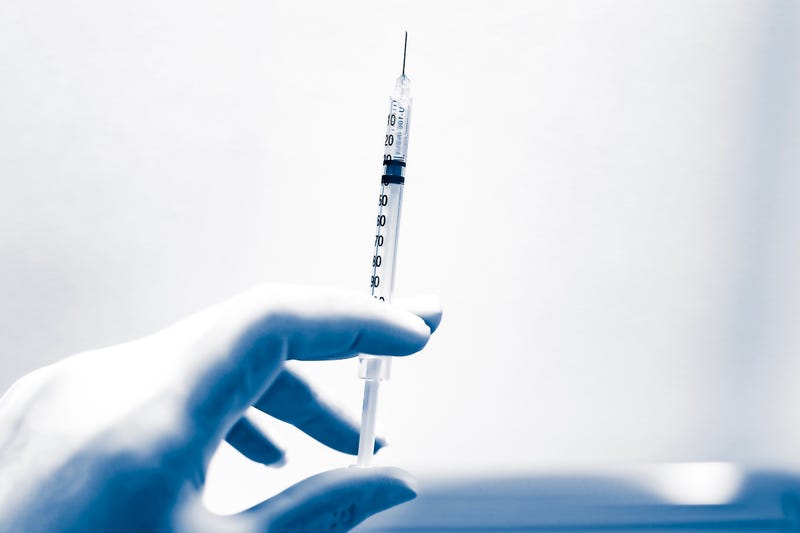
SAN FRANCISCO (KCBS RADIO) – Scientists have identified a vaccine as a “promising treatment” for certain patients with a group of bone marrow cancers, according to a research article published Wednesday in the Science Translational Medicine Journal.
This is just one of the bits of research indicating that more cancer vaccines are on the horizon and that they could one day be the go-to for cancer treatment.
Researchers saw a response to heteroclitic peptide–based cancer vaccines used to treat myeloproliferative neoplasms with calreticulin mutation in out-of-body patient samples and mice. Myeloproliferative neoplasms are a group of disorders where bone marrow makes too many red blood cells, white blood cells, or platelets, according to the National Cancer Institute.
Last month, Memorial Sloan Kettering Cancer Center in New York announced that a messenger RNA pancreatic cancer vaccine trial showed promising results. Recently, mRNA vaccines have become well known since they are used to prevent COVID-19 infection.
Use of vaccines to treat cancer could one day become standard, according to a report this week in The Washington Post. Today’s standard cancer treatments – surgery, chemotherapy, and radiation – are associated with different risks and side effects compared to vaccines.
Around 12 years ago, the U.S. Food and Drug Administration has approved sipuleucel-T (Provenge) vaccine for people with prostate cancer that has spread, according to the American Society of Clinical Oncology. However, The Post said this vaccine “doesn’t provide a huge benefit,” as it increases overall expected survival by only four months.
Two other vaccines target the HPV and Hepatitis B viruses, which can lead to cancer in infected patients. These are preventative vaccines, while the prostate cancer vaccine is therapeutic. Another preventative vaccine in the works is one that would target lesions such as colon polyps that have not yet become malignant.
In general, “vaccines are medicines that help the body fight disease,” the American Society of Clinical Oncology explained. “They can train the immune system to find and destroy harmful germs and cells.”
“Therapeutic vaccines introduce substances that stimulate the production of new immune cells that can fight the tumor,” said Keith Knutson, a cancer vaccine researcher at the Mayo Clinic in Florida. “We inject an antigen – a miniature piece of a protein, a fragment – that stimulates the production of T cells capable of attacking the tumor.”
Going forward, Olivera Finn, a distinguished professor of immunology at the University of Pittsburgh who was part of the team who first identified a tumor-specific antigen, believes that doctors will be able to make personalized vaccines for patients.
“We are setting the stage,” Finn said. “I believe there will be a time in the future when a doctor will be able to identify your risk for certain cancers and give you a vaccine to prevent them.”
Experimental therapeutic cancer vaccines are personalized based on tumor samples in some cases. These are known as neoantigens vaccines, as they arise from neoantigens, or mutations unique to a person’s cancer cells.
“Targeting neoantigens is really something quite novel,” said Patrick Ott, clinical director of the Melanoma Disease Center at the Dana-Farber Cancer Institute.
Researchers working to create vaccines for cancer are on the lookout for novel solutions, because cancer cells can often look so much like any other cell in a human body.
“They hide their differences, so they look like normal cells,” explained Jay Berzofsky, chief of the National Cancer Institute’s vaccine branch. “The idea of a cancer vaccine is to activate the immune system to pick out ways that the cancer is different from normal cells, recognize them as foreign and reject them.”
In addition to vaccines, researchers at Memorial Sloan announced this month that tumors disappeared for every one of 12 rectal cancer patients who received monoclonal antibody therapy during a recent clinical trial. Monoclonal antibodies – which, like vaccines, have been used to help COVID-19 patients – are laboratory-made proteins that mimic the immune system’s ability to fight off harmful pathogens.
Both treatments leverage the body’s own immune system to fight cancer. Researchers continue to study these options, which could completely change the way cancer is treated in the future.
LISTEN on the Audacy App
Sign Up and Follow Audacy
Facebook | Twitter | Instagram